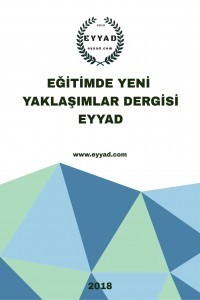Üniversite Öğrencilerinin Öğrenmeye Yönelik Tutumlarının İncelenmesi
Üniversite öğrencileri, Öğrenme, Tutum, Nicel araştırma, University students, Learning, Attitude, Quantitative research
Investigation of University Students' Attitudes to Learning
University students, Learning, Attitude, Quantitative research,
___
- Adıgüzel, A. & Dolmacı, A. (2018). Öğretmen adaylarının öğrenmeye yönelik tutumlarının farklı değişkenlere göre incelenmesi. Anadolu Eğitim Liderliği ve Öğretim Dergisi, 6(2),63-79. htps://dergipark.org.tr/en/pub/ajeli/issue/41881/438499
- Aktürk, A.O. (2012). Öğretmen adaylarının öğrenmeye ilişkin tutumlarının öğretmenlik mesleğini tercih etme nedenlerine ve akademik başarılarına göre incelenmesi. Ahi Evran Üniversitesi Kırşehir Eğitim Fakültesi Dergisi, 13(3), 283-297.
- Allport, Gordon W. (1967). Pattern and Growth in Personality. Oxford, England: Holt, Reinhart & Winston.
- Ataseven, N. (2014). Eğitim fakültesi öğrencilerinin öğrenme stilleri ve öğrenme stratejileri arasındaki ilişkinin incelenmesi (Master's thesis, Balıkesir Üniversitesi Sosyal Bilimler Enstitüsü).
- Bahadır, F. (2022). Gelecek beklentilerine göre öğretmen adaylarının öğrenmeye yönelik tutumlarının incelenmesi. Bayburt Eğitim Fakültesi Dergisi, 17(34), 459-473.
- Bråten, I., & Strømsø, H. I. (2006). Epistemological beliefs, interest, and gender as predictors of Internet-based learning activities. Computers in Human Behavior, 22(6), 1027-1042.
- Brookover, W. B. (1969). Pygmalion in the Classroom: Teacher Expectation and Pupils' Intellectual Development. ABD: Holt, Rinehart and Winston, Inc
- Çetin, Ş., & Çetin, F. (2019). Öğrenmeye yönelik tutum ölçeği (ÖYTÖ) geliştirme çalışması. Türk Eğitim Bilimleri Dergisi, 17(1), 140-157.
- Demirel, Özcan (1993). Eğitim Terimleri Sözlüğü. Ankara: Şafak Matbaacılık
- Dikmen, M. (2021). Öğretmen adaylarının öğretme motivasyonu: Bir karma yöntem çalışması. e-Kafkas Journal of Educational Research, 8(2), 213-232.
- Dikmen, M., Şimşek, M., & Tuncer, M. (2018). Öğrenme stilleri ile öğrenmeye yönelik tutum arasındaki ilişki. Uluslararası Sosyal Araştırmalar Dergisi, 11(57), 388-400.
- Duarte, A. M. (2007). Conceptions of learning and approaches to learning in Portuguese students. Higher education, 54(6), 781-794.
- Erdoğdu, M. Y. (2020). The roles of attitudes towards learning and opposite sex as a predictor of school engagement: mixed or single gender education?. Palgrave Communications, 6(1), 1-9.
- Fishbein, M. (1967). A consideration of beliefs, and their role in attitude measurement. In M. Fishbein (Ed.), Readings in attitude theory and measurement (pp. 257-266). New York: John Wiley & Sons
- Göloğlu Demir, C. (2021). Meslek Yüksekokulu Öğrencilerinin Öğrenmeye Yönelik Tutumlarının Belirlenmesi. Gazi Üniversitesi Gazi Eğitim Fakültesi Dergisi, 41(1), 415-439.
- Hamurcu, H. (2018). Examination of attitudes to learning and educational stress in prospective primary school teachers: İzmir Buca sample. Educational Research and Reviews, 13(2), pp. 92-105, 23. DOI: 10.5897/ERR2017.3431
- Hogg, M., & Vaughan, G. (2005). Social Psychology (4th edition). London: Prentice-Hall.
- Kakupa, P., & Xue, H. (2019). Students' Attitudes towards Research: A Study of Graduate Education Students at a Chinese Normal University. Educational Process: International Journal, 8(2), 97-110.
- Kaysi, F., & Aydemir, E. (2017). Uzaktan Eğitim Süreçlerindeki Etkileşim Boyutlarının Değerlendirilmesi. Sosyal Bilimler Dergisi, 4(11), 778–790.
- Kazazoğlu, Semin (2013). Türkçe ve İngilizce derslerine yönelik tutumun akademik başarıya etkisi. Eğitim ve Bilim, 38(170). 294-307.
- Korkmaz, İ. (2020). Nicel araştırmalarda evren, örneklem, örnekleme teknikleri. B. Oral, A. Çoban (Ed.), Kuramdan Uygulamaya Eğitimde Bilimsel Araştırma Yöntemleri (205-227. ss) Ankara: Pegem Akademi
- Marton, F., & Saljo, R. (1997). Approaches to Learning. In Marton, F., Hounsell, D., Entwistle, N.(ed.). The Experience of Learning. Edinburgh: Scottish Academic Press.
- Mullis, I. V. S., Martin, M. O., Goh, S., & Cotter, K. (2016). TIMSS 2015 Encyclopedia: Education policy and curriculum in mathematics and science. Boston College, TIMSS & PIRLS International Study Center website.
- Pierce, R., Stacey, K., & Barkatsas, A. (2007). A scale for monitoring students’ attitudes to learning mathematics with technology. Computers & Education, 48(2), 285-300.
- Şen, H. Ş. (2013). The attitudes of university students towards learning. Procedia-Social and Behavioral Sciences, 83, 947-953.
- Şimşek, Ü. (2021). Sosyal Bilgiler Öğretmen Adaylarının Öğrenmeye İlişkin Tutumları ile İngilizce Dil Öğrenme Motivasyonları Arasındaki İlişkinin İncelenmesi. EJERCongress 2021, 81.
- Tabachnick, B. G., Fidell, L. S., & Ullman, J. B. (2007). Using multivariate statistics (Vol. 5, pp. 481-498). Boston, MA: Pearson.
- Tuncer, M. (2020). Nicel araştırma desenleri. B. Oral, A. Çoban (Ed.), Kuramdan Uygulamaya Eğitimde Bilimsel Araştırma Yöntemleri (205-227. ss) Ankara: Pegem Akademi
- Tuncer, M., Berkant, H.G., & Dikmen, M., (2017). Sosyal araştırmalardaki ölçek bulgularına örneklem etkisinin araştırılması. Elektronik Eğitim Bilimleri Dergisi, 6(11),1-10.
- Özkal, N., & ÇETİNGÖZ, A. G. D. D. (2006). Akademik başarı, cinsiyet, tutum ve öğrenme stratejilerinin kullanımı. Kuram ve Uygulamada Eğitim Yönetimi, 46(46), 259-275.
- Výrost, J. (1989). Sociálno-psychologický výskum postojov. Bratislava: Veda.
- Yavuz Konokman, G., & Yanpar Yelken, T. (2014). Okul öncesi öğretmeni adaylarının öğrenmeye ilişkin tutumlarının ve girişimcilik düzeylerinin incelenmesi. International Online Journal of Educational Sciences, 6(3), 648-665.
- ISSN: 2667-5390
- Yayın Aralığı: Yılda 2 Sayı
- Başlangıç: 2018
- Yayıncı: Ahmet DURMAZ
Üniversite Öğrencilerinin Oryantasyon Sorunları ve Beklentilerine İlişkin Bir Oryantasyon Planı
Fen Öğretiminde Okul Dışı Öğrenme Faaliyetlerine Yönelik Öğretmen Öz Yeterlik İnançları
Öğretmen Eğitiminde Çevrimiçi Bir Ders Etkinliği Tasarımı: Padlet Kullanımı
Nezih ÖNAL, Nagihan TANIK ÖNAL
İlkokul 4.Sınıf Öğrencilerinin Ev Ödevlerine Yönelik Tutumlarının Belirlenmesi
Ayşe KÖSE PEKTAŞ, Perihan ULUCAN
Siyasi Parti Seçim Beyannamelerinde Eğitim Politikaları: 2000-2022
Lise Öğrencilerinin Üstbiliş Düşünme Becerileri
Üniversite Öğrencilerinin Öğrenmeye Yönelik Tutumlarının İncelenmesi
